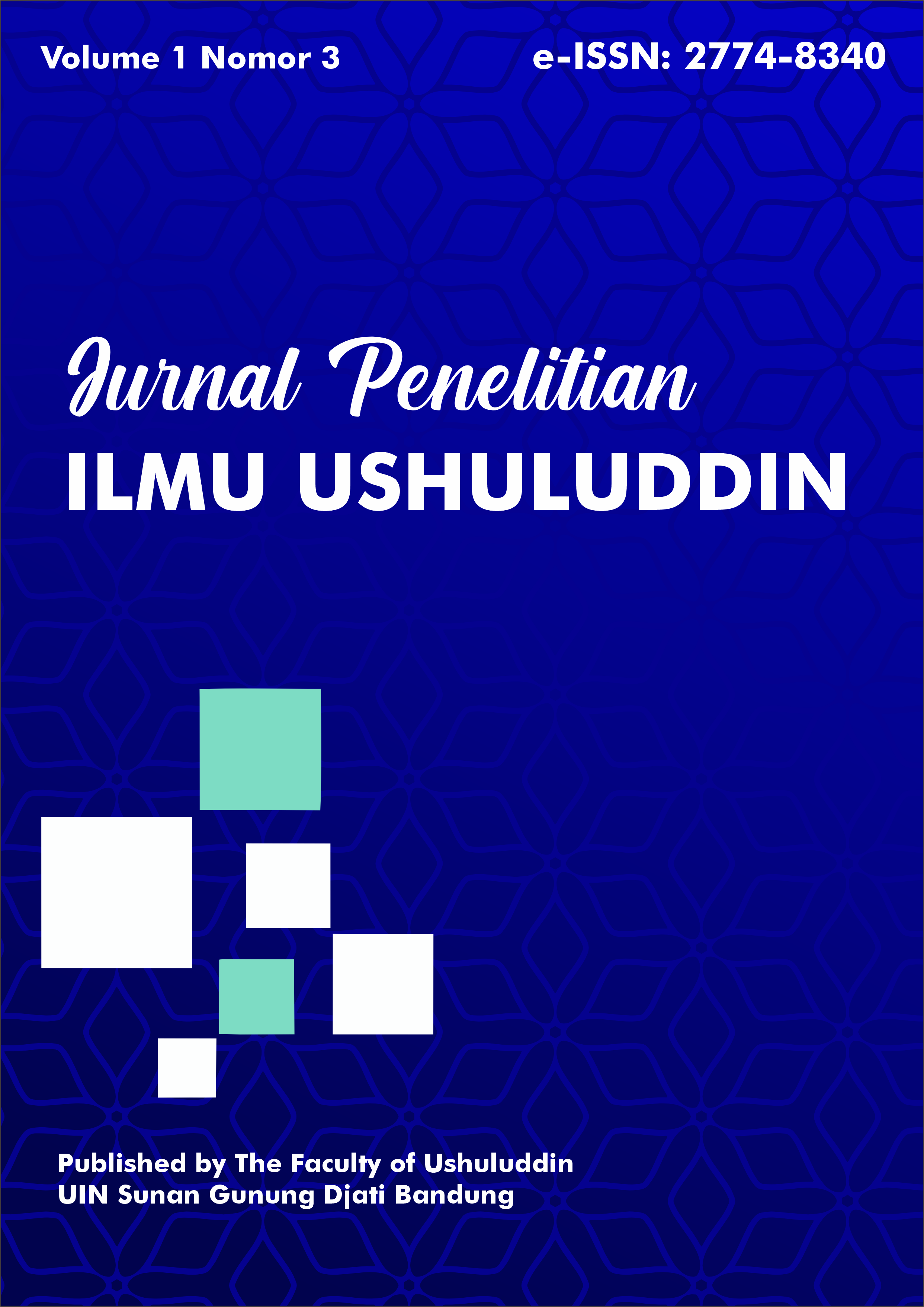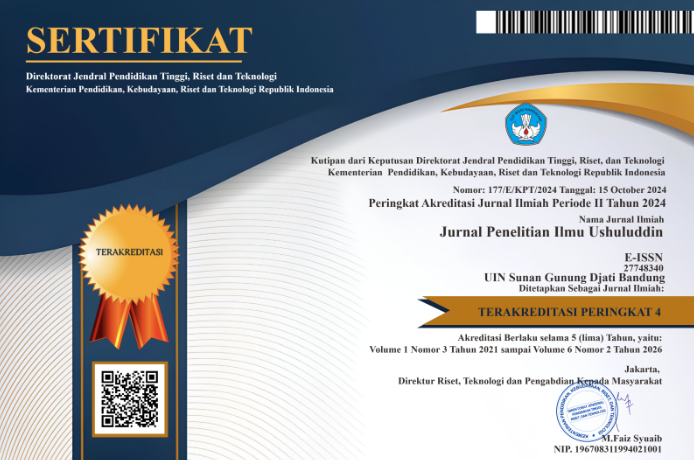Living Teologi Tradisi Tolak Bala Bepapas pada Masyarakat Desa Parit Setia Kecamatan Jawai Kabupaten Sambas Kalimantan Barat
DOI:
https://doi.org/10.15575/jpiu.12242Keywords:
Islamic Theology, Parit Setia Village, Tradition Tolak Bala BepapasAbstract
This study examines Islam that lives in the Parit Setia community. In the Parit Setia community there is a tradition tolak bala Bepapas. The purpose of this research is to answer the problems that are the subject of discussion: 1) Definition of the tradition tolak bala Bepapas; 2) Understanding the community's theology of the tradition tolak bala Bepapas; and 3) The values contained in the tradition tolak bala Bepapas. This research is a field research, with a phenomenological approach, qualitative methods, and living theology as a knife of analysis. The findings in this research show that: First, historically the tradition tolak bala Bepapas is a tradition that resulted from a mixture of culture and religion. Tradition is carried out as an effort to avoid all forms of danger, which is symbolized through leaves and is led by a traditional leader (pak Labbai). Second, this tradition has long been rooted so that it is considered sacred. Even though there are differences of opinion in responding to it, this tradition still exists today as a cultural identity of society. Third, the determination of religious values contained in this tradition is based on the principles of tawhid, which substantially have values for relating to nature, maintaining friendship, asking for salvation and as a form of gratitude to Allah SWT. Observing all the findings in the field, it is not an exaggeration to conclude that this tradition is a living Islam (living Islamic theology) in the Parit Setia community.
References
Admin. (2011, Februari 09). Perkembangan Islam di Kalimantan Barat. Dipetik April 09, 2021, dari Kalbariana: https://kalbariana.web.id/perkembangan-islam-di-kalimantan-barat/
Alfan, M. (2013). Filsafat Kebudayaan. Bandung: Pustaka Setia.
Azaransky, C. M. (2017). Lived Theology New Perspectives On Method, Style And Pedagogy. New York: Oxford University Press .
Aziz, A. A. (2020). Living Teologi: Religiusitas dan Hubungan Sosial Pedagang Kaki Lima. Jurnal Theologia, 31(1), 87-114.
Azwar, S. (1999). Metode Penelitian. Jakarta: Pustaka Pelajar.
Berti, E. (2021). Tradisi Bepapas sebagai Media Dakwah di Desa Sumber Harapan Kecamatan Sambas. Jurnal SAMBAS:(Studi Agama, Masyarakat, Budaya, Adat, Sejarah) Journal of Religious, Community, Culture, Costume, History Studies, 3(2), 95-119.
Darmalaksana, W. (2020). Metode Penelitian Kualitatif Studi Pustaka dan Studi Lapangan. Pre-Print Digital Library UIN Sunan Gunung Djati Bandung.
Darmalaksana, W., Alawiah, N., Thoyib, E. H., Sadi'ah, S., & Ismail, E. (2019). Analisis Perkembangan Penelitian Living Al-Qur'an dan Hadis. Jurnal Perspektif.
Fadinsi. (2021, April 9). Pelaksanaan Tradisi Tolak Bala Bepapas Pada Hari Jumat. (R. Madriani, Interviewer)
Gustiranto, G., & Tantoro, S. (2017). Nilai-nilai Tradisional Tolak Bala di Desa Betung Kecamatan Pangkalan Kuras Kabupaten Pelalawan (Doctoral dissertation, Riau University).
Halida. (2021, April 9). Pemahaman Masyarakat Terhadap Tradisi Tolak Bala Bepapas. (R. Madriani, Interviewer)
Halim. (2021, April 9). Tradisi Tolak Bala Bepapas Akultrasi Budaya. (R. Madriani, Interviewer)
Hanafi, A. (1995). Pengantar Teologi Islam. Jakarta: Al Husna Zikra.
Hardiansyah, H. (2013). Teori Pengetahuan Edmund Husserl. Substantia: Jurnal Ilmu-Ilmu Ushuluddin, 15(2), 226-236.
Hasbullah, H., Toyo, T., & Pawi, A. A. A. (2017). Ritual Tolak Bala Pada Masyarakat Melayu (Kajian Pada Masyarakat Petalangan Kecamatan Pangkalan Kuras Kabupaten Pelalawan). Jurnal ushuluddin, 25(1), 83-100.
Ahimsa-Putra, H. S. (2012). The Living Al-Qur’an: Beberapa Perspektif Antropologi. Walisongo: Jurnal Penelitian Sosial Keagamaan, 20(1), 235-260.
Hendriansyah, H. (2021). Metode Penelitian Kualitatif. Jakarta: Salemba Humanika.
Ijas. (2021, Maret 10). Pandangan Masyarakat Terhadap Tradisi Tolak Bala Bepapas. (Revi, Interviewer)
Jamil, A. (2000). Islam dan Kebudayaan Jawa. Yogyakarta: Gama Media.
Jayadi. (n.d.). Makna Tradisi Bepapas Dalam Masyarakat Sambas. Retrieved from : http///www.nukhatulistiwa.com
Khwaja, J. (2012). Living the Qur'an: in Our Time. New Delhi: Sage Publication.
Lacy, C. (1983). Book Review: Living Theology in Asia.
Masykur, A. R. (2013). Sejarah Filsafat Barat. Yogyakarta: IRCiSoD.
Mustafa, M. D. (2006). Reorientasi Teologi Islam dalam Konteks Pluralisme Beragama. HUNAFA: Jurnal Studia Islamika, 3(2), 129-140.
Mustansyir, R. (2016). Kearifan Lokal Masyarakat Melayu Sambas Tinjauan Filosofis. Yogyakarta: Fakultas Filsafat.
Permata, C. (n.d.). Bentuk Dan Makna Penamaan Tempat Di Kecamatan Jawai Kab. Sambas . Retrieved from https ://jurnal.untan.ac.id
Qomaruzzaman, B. (2020). Belajar Teologi di Tengah Corona. Bandung.
Rahman, F. (1965). Islamic Methodologi in History. Islamabad: Islamic Research Institute.
Risa. (2014). Islam Di Kerajaan Sambas Antara Abad XV - XVII : Studi Awal Tentang Islamisasi Di Sambas. Jurnal Khatulistiwa, 105.
Rumila. (2021, April 9). Kritik Terhadap Pelaksanaan Tradisi Tolak Bala Bepapas. (R. Madriani, Interviewer)
Said. (2021, April 9). Menu Makanan Pada Tradisi Tolak Bala Bepapas. (R. Madriani, Interviewer)
Soehadha, M. (2016). Tauhid budaya: Strategi sinergitas Islam dan budaya lokal dalam perspektif antropologi Islam. Tarjih: Jurnal Tarjih dan Pengembangan Pemikiran Islam, 13(1), 15-32.
Sugiyono. (2014). Metode Penlitian Kuantitatif dan Kualitatif. Bandung: Alfabeta.
Sujarwa. (1999). Manusia dan Fenomena Budaya Menuju Perspektif Moralitas Agama. Yogyakarta: Pustaka Pelajar.
Sulaeman, S., Malawat, M., & Darma, D. (2019). Konstruksi Makna Bakupukul Manyapu bagi Masyarakat Mamala Maluku. Jurnal Antropologi: Isu-Isu Sosial Budaya, 21(1), 61-72.
Syam, S. (2018). Tradisionalisme Islam Suatu Karakter Dan Pola Pengembangan Islam Di Indonesia. Al-Hikmah: Jurnal Dakwah dan Ilmu Komunikasi, 20-30.
Syarbini, H. A. (2011). Islam dan Kearifan Lokal (Local Wisdom): Menelusuri Nilai-nilai Islam dalam Praktik Ritual Adat Masyarakat Banten. In The 11 Th Annual Conference on Islamic Studies (p. 170).
Tara, T. (2017). Memahami Model-Model Teologi Kontekstual Stephen B. Bevans dalam Konteks Budaya Ende-Lio sebagai Bagian dari Kejujuran Berteologi. Atma Reksa: Jurnal Pastoral dan Kateketik, 2(1), 48-59.
Triwahyuni, E., Hasanah, U., & Nur, S. M. (2020). Tradisi Sedekah Tolak Bala pada Masyarakat Desa Langkan Kecamatan Banyuasin III Kabupaten Banyuasin.
Wijarnako, B. (2013). Pewarisan Nilai-Nilai Kearifan Tradisional dalam Masyarakat Adat (Peranan Kepala Adat dalam Mewariskan aturan Adat di Kampung Adat Dukuh Desa Cijambe, Kecamatan Cikelet, Kabupaten Garut, Propinsi Jawa Barat). Jurnal Geografi Gea, 13(2).
Zuhri, H. (2018). Living Islam Apa dan Mau ke Mana?. Living Islam: Journal of Islamic Discourses, 1(1), 1-30.
Downloads
Published
Issue
Section
License
Authors who publish in Jurnal Penelitian Ilmu Ushuluddin agree to the following terms:
- Authors retain copyright and grant the journal right of first publication with the work simultaneously licensed under an Attribution-ShareAlike 4.0 International (CC BY-SA 4.0) License that allows others to share the work with an acknowledgment of the work's authorship and initial publication in this journal.
- Authors are able to enter into separate, additional contractual arrangements for the non-exclusive distribution of the journal's published version of the work (e.g., post it to an institutional repository or publish it in a book), with an acknowledgment of its initial publication in this journal.
- Authors are permitted and encouraged to post their work online (e.g., in institutional repositories or on their website) prior to and during the submission process, as it can lead to productive exchanges, as well as earlier and greater citation of published work (See The Effect of Open Access).












